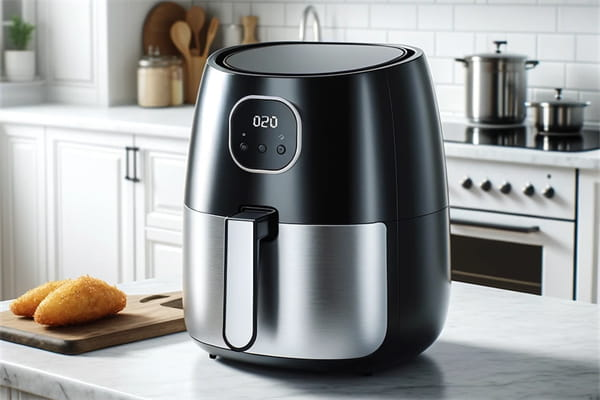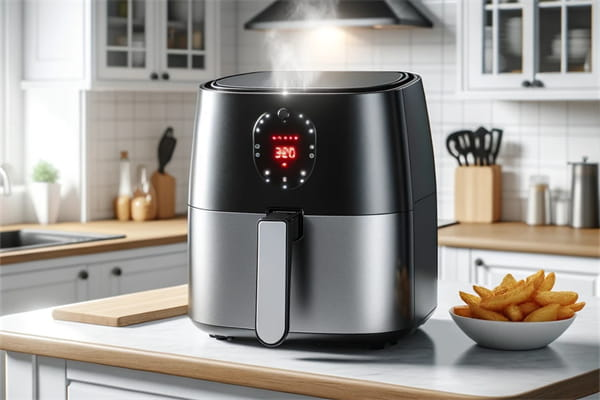As air fryers become increasingly popular for their convenience and health benefits, an important question remains: how much electricity do air fryers use? In this article, we’ll discuss the electricity consumption of air fryers and provide insights on cost, influencing factors, and tips for saving energy. Whether you’re considering buying one or already have an air fryer, understanding its energy use can help you make smarter choices in the kitchen.
Ⅰ. How Much Electricity Do Air Fryers Consume?

1.Overview of Power Consumption
Air fryers typically range in power consumption from 800 watts to 1800 watts, depending on their size and model. Smaller air fryers tend to be on the lower end of this range, while larger, more powerful models can reach the higher end. For instance, a compact air fryer might consume around 800 watts, while a medium-sized model could use approximately 1400 watts. Larger, family-sized air fryers can go up to 1800 watts.
2.Examples
To put this into perspective, let’s break down the electricity consumption of different sizes:
- Small Air Fryer (800W): If you use it for 30 minutes, it would consume 0.4 kWh (800 watts x 0.5 hours = 0.4 kWh).
- Medium Air Fryer (1400W): Using it for the same duration would consume 0.7 kWh (1400 watts x 0.5 hours = 0.7 kWh).
- Large Air Fryer (1800W): Running it for 30 minutes would consume 0.9 kWh (1800 watts x 0.5 hours = 0.9 kWh).
3.Comparison to Other Appliances
When comparing air fryers to other common kitchen appliances, they generally use less electricity. For example, a conventional oven might use around 2,400 watts, significantly more than even the largest air fryer. Similarly, a microwave can consume between 600 to 1200 watts, depending on the model, making air fryers comparable or slightly higher in power usage.
Ⅱ. How Much Does It Cost to Run an Air Fryer?
1.Calculating Cost
Calculating the cost of running an air fryer involves a simple formula:
Wattage×Hours Used/1000=kWh
kWh×Electricity Rate=Cost
For instance, let’s assume an electricity rate of $0.12 per kWh:
Small Air Fryer (800W):
0.4 kWh x $0.12 = $0.048 per 30-minute use.
Medium Air Fryer (1400W):
0.7 kWh x $0.12 = $0.084 per 30-minute use.
Large Air Fryer (1800W):
0.9 kWh x $0.12 = $0.108 per 30-minute use.
2.Cost Comparison
Comparing these costs to using a conventional oven for a similar task, you can see potential savings. An oven might consume 1.2 kWh (2400 watts x 0.5 hours), costing $0.144 per 30-minute use at the same electricity rate. Therefore, using an air fryer can save you a few cents per use, which adds up over time.
Ⅲ. Factors Affecting Air Fryer Energy Consumption
Several factors can influence how much electricity your air fryer uses:
1.Usage Frequency
Naturally, the more often you use your air fryer, the more electricity it will consume. However, because air fryers cook food quickly, they often end up being more energy-efficient than other cooking methods.
2.Cooking Time and Temperature
Higher temperatures and longer cooking times will increase energy consumption. For example, cooking at 400°F will use more energy than cooking at 350°F. It’s important to follow recipe guidelines to avoid overusing energy.
3.Air Fryer Capacity and Size
Larger capacity air fryers generally use more power. If you’re only cooking for one or two people, a smaller air fryer might be more energy-efficient.
4.Efficiency of the Model
Newer models are often more efficient than older ones. Advances in technology can lead to better insulation and heating mechanisms that use less electricity.
Ⅳ. Tips for Saving Electricity with Your Air Fryer
1.Optimal Usage
Use your air fryer for smaller meals rather than heating up a large oven. Air fryers heat up quickly and cook food faster, which can save electricity.
2.Preheating
While some recipes call for preheating, it’s often unnecessary for air fryers. Skipping the preheating step can save a small amount of energy each time you cook.

3.Batch Cooking
If you’re cooking for a family, try to cook multiple items at once. This reduces the number of times you need to run the air fryer, saving energy overall.
4.Regular Maintenance
Keep your air fryer clean and well-maintained. A dirty air fryer can take longer to cook food, using more electricity in the process. Make sure to clean the air fryer basket and heating elements regularly.
5.Smart Usage Habits
Set the right temperature and cooking time to avoid overcooking. Using a lower temperature or shorter cooking time whenever possible can save energy. Experiment with your recipes to find the most efficient cooking settings.
Ⅴ. Conclusion
While air fryers do use electricity, their efficiency and convenience often make them a cost-effective and energy-saving choice for many households. By understanding their power consumption, you can make informed decisions about how and when to use your air fryer. Incorporate the tips provided to maximize energy savings and enjoy the benefits of this versatile kitchen appliance.